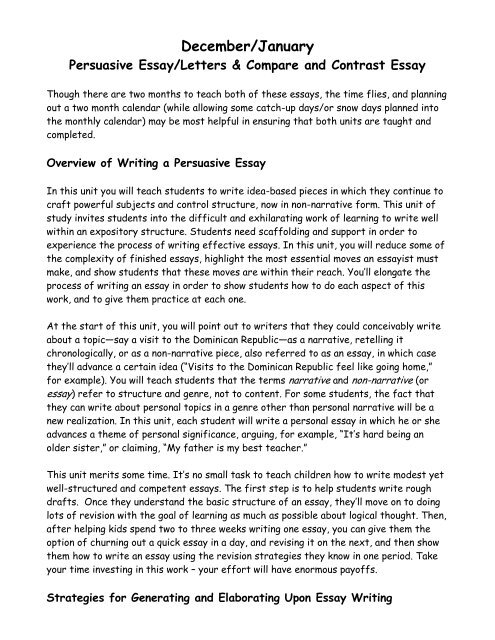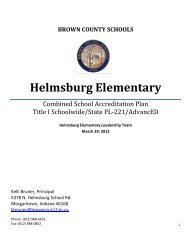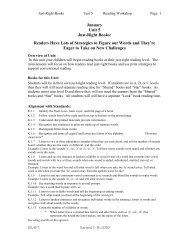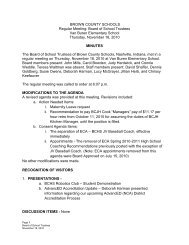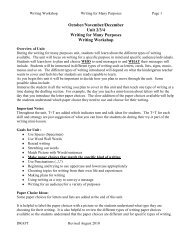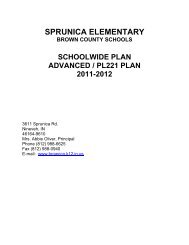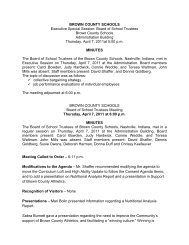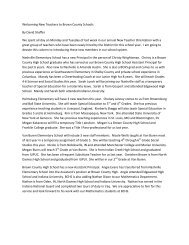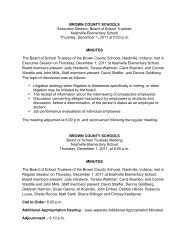Grades 5 and 6 Writing Units of Study.pdf
Grades 5 and 6 Writing Units of Study.pdf
Grades 5 and 6 Writing Units of Study.pdf
Create successful ePaper yourself
Turn your PDF publications into a flip-book with our unique Google optimized e-Paper software.
December/January<br />
Persuasive Essay/Letters & Compare <strong>and</strong> Contrast Essay<br />
Though there are two months to teach both <strong>of</strong> these essays, the time flies, <strong>and</strong> planning<br />
out a two month calendar (while allowing some catch-up days/or snow days planned into<br />
the monthly calendar) may be most helpful in ensuring that both units are taught <strong>and</strong><br />
completed.<br />
Overview <strong>of</strong> <strong>Writing</strong> a Persuasive Essay<br />
In this unit you will teach students to write idea-based pieces in which they continue to<br />
craft powerful subjects <strong>and</strong> control structure, now in non-narrative form. This unit <strong>of</strong><br />
study invites students into the difficult <strong>and</strong> exhilarating work <strong>of</strong> learning to write well<br />
within an expository structure. Students need scaffolding <strong>and</strong> support in order to<br />
experience the process <strong>of</strong> writing effective essays. In this unit, you will reduce some <strong>of</strong><br />
the complexity <strong>of</strong> finished essays, highlight the most essential moves an essayist must<br />
make, <strong>and</strong> show students that these moves are within their reach. You‘ll elongate the<br />
process <strong>of</strong> writing an essay in order to show students how to do each aspect <strong>of</strong> this<br />
work, <strong>and</strong> to give them practice at each one.<br />
At the start <strong>of</strong> this unit, you will point out to writers that they could conceivably write<br />
about a topic—say a visit to the Dominican Republic—as a narrative, retelling it<br />
chronologically, or as a non-narrative piece, also referred to as an essay, in which case<br />
they‘ll advance a certain idea (―Visits to the Dominican Republic feel like going home,‖<br />
for example). You will teach students that the terms narrative <strong>and</strong> non-narrative (or<br />
essay) refer to structure <strong>and</strong> genre, not to content. For some students, the fact that<br />
they can write about personal topics in a genre other than personal narrative will be a<br />
new realization. In this unit, each student will write a personal essay in which he or she<br />
advances a theme <strong>of</strong> personal significance, arguing, for example, ―It‘s hard being an<br />
older sister,‖ or claiming, ―My father is my best teacher.‖<br />
This unit merits some time. It‘s no small task to teach children how to write modest yet<br />
well-structured <strong>and</strong> competent essays. The first step is to help students write rough<br />
drafts. Once they underst<strong>and</strong> the basic structure <strong>of</strong> an essay, they‘ll move on to doing<br />
lots <strong>of</strong> revision with the goal <strong>of</strong> learning as much as possible about logical thought. Then,<br />
after helping kids spend two to three weeks writing one essay, you can give them the<br />
option <strong>of</strong> churning out a quick essay in a day, <strong>and</strong> revising it on the next, <strong>and</strong> then show<br />
them how to write an essay using the revision strategies they know in one period. Take<br />
your time investing in this work – your effort will have enormous pay<strong>of</strong>fs.<br />
Strategies for Generating <strong>and</strong> Elaborating Upon Essay <strong>Writing</strong>


